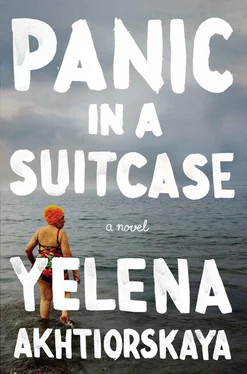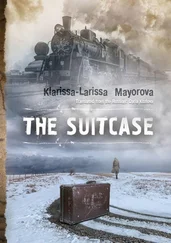A coy look came over the guest’s face. What’s this, he said, a Russian household with no vodka?
God forbid. Levik rummaged around behind the radiator that during the winter gave off, if anything, frost, and introduced a family-size bottle of the clear stuff.
And they’d been under the impression that Americans didn’t drink. Lamborg’s shot glass existed in a perpetually drained, expectant state. Just refilling it (without drawing too much attention to the refilling) was a full-time job. Lamborg had taken to heart the custom that it was rude to drink when a toast wasn’t being offered. The Nasmertovs had proposed one or two at the meal’s commencement — concise, practical, for health and wealth. But then Lamborg made a few increasingly far-fetched toasts himself — to enviable households, to new countries and new friends, white nights and black seas — and they realized with horror that they were supposed to keep cranking out the toasts so their guest could keep imbibing. Three-quarters of the bottle (which was the size of a child’s leg) disappeared with practically no help from them.
Frida had expected the stranger to leave in an hour, two at most. During her brief stint at the table, she had been too uncomfortable and indignant to eat. Once the adrenaline from the tantrum subsided, she found that she was starving. But you don’t throw stockings at your mother’s face in front of an important visitor you’re supposed to be impressing only to return an hour later for some pelmeni. She remembered all the delicacies on the table. Esther’s homemade cherry vareniki in thick crimson sauce had virtually disappeared from their culinary repertoire as of late. They were labor-intensive, and the cherries here were not like the cherries grown back on their dacha. But the vareniki were currently in a bowl on that table in the living room, to which Frida could possibly very quietly return once the visitor was gone. She had pride. She would starve to death before facing that man again. And starve she would, because the hours kept passing with no sign of his departure. If the visitor were making an exit, the entire family would escort him to the end of the corridor, where they’d orchestrate a loud, festive, dramatic, prolonged farewell — to seal in the specialness of the occasion and properly launch it up the memory chute. So Frida was prepared to overhear the finale, which, like any proper climax, would be audible through a closed door, a door to which she pressed her ear every quarter hour. What the hell was going on out there? The silence stretched for so long and the cherry sauce grew so vivid that Frida suddenly thought, Maybe I fell asleep without realizing and in the meantime the visitor left? So she cracked her door a smidgen and peeked — to find the visitor’s shoes waiting under the mirror. Murmurings leaked out, there was the scrape of porcelain, a muffled cough. She almost succumbed to the urge to rush into the living room and grab as many vareniki as she could with her hands — but they were slippery, they’d slide out. She shut the door and sank into despair.
The knob turned. Esther stuck in her head.
Are you hungry?
No, said Frida. I hate you.
Not even for some cherry vareniki?
Esther was unexpected in the role of savior. Usually she was the one advocating for harsher measures and stricter policies, being of the opinion that naughty girls who don’t respect their elders must be taught a lesson and that once you set out to teach a lesson, Marina, you have to go through with it. Marina had a tendency to cave the instant her initial rage subsided. Then it was all kisses, togetherness, laughs — to absolutely no disciplinary result. Mixed messages only made a more stubborn monster out of Frida. When the door opened and it wasn’t Marina, Frida felt a flare of reinvigorated anger, as if her mother had broken a promise to relent. But here was Esther with her gray face and ratty wig, her sticky sweat and palpable not-wellness, offering Frida not just sustenance but assistance in taking the first step toward a return to public life. A shame — Frida preferred to regard her grandma as the enemy.
Where’d he go? asked Frida.
Still here.
He’s an idiot, said Frida, intending to anger.
And a drunk, said Esther.
• • •
PASHA SAW THE ÉMIGRÉ POETS — Renata Ostraya, Nurzhan Bozhko, Andrei Fishman, Efim and Sofya Milturn — finding them, to his surprise, every bit as lively as he had the summer before. This time they came to Brighton, as Pasha didn’t want to leave his mother for the entire evening. He thought his refusal to traverse the Brooklyn Bridge would mean that he wouldn’t get to see them, but they scrapped their plans and boarded the train, emerging boisterous and rowdy. Pasha was apparently providing them with an opportunity for adventure. They approached Brighton with the attitude that it was hilarious and exotic. They were strictly explorers, anthropologists in an absurd land. Of course a good anthropologist must participate fully in the local customs, no matter how bizarre. Once they got off the train, they piled into the nearest gastronom and loaded up on cheap liter bottles of Ukrainian beer and kvass, filled containers with pickled cabbage and tomatoes, grabbed packets of dried salted fish, then stopped off at the liquor store for that very thing a Russian household couldn’t do without. Provisions in hand, they made straight for the shore, for a picnic in the moonlight.
Pasha followed along, feeling vague stirrings of resentment. This was a real neighborhood where people lived, people with families and tight budgets and, furthermore, people who spoke and read in the language in which they wrote. No reason to feel so high-and-mighty, to act like the nobleman who’d put on a peasant’s frock to play the part for a night. And his mother was sick — one block away, she lay in bed, vomiting into a tub. Pasha wasn’t in disguise. But then they were creeping along on night-trampled sand about as redolent of nature as a bath mat. After finding a spot to settle, he was able to relax. It was as if he’d been collecting evidence against them into a plastic bag that was punctured by one of the ubiquitous glass shards when he plopped onto the sand. All evidence leaked out into the ocean. It was a nice night. So much so that Pasha, after a long sigh, said, What a nice night. Who was it that said one must make a habit of saying aloud when something is nice?
My uncle Dodya, for one, said Sofya Milturn. She’d grown appealing in the dark. What the moon did to the ocean’s surface it also did to her hair, illuming a path through the smoothness and ripples. In the light she was gawky, boyish, angular, but now she was lithe — a clean, elegant silhouette. Ostraya was out of her element, breathing heavily and trying to unstick individual sand grains from her large white calves. The group honored a pensive period. But they drank steadily throughout and were returned to rowdiness.
Fishman drummed on an overturned garbage can, Renata accompanied in song, while Pasha told of the time he got caught in a twister and made the chance discovery of an elaborate under-the-boardwalk world — tunnels, stoves, birdcages.
Care to show us? said Bozhko.
Pasha didn’t, really.
Come on.
Pasha leaned back, digging his elbows into the sand.
What, are you afraid? Or have you just been using your creative license?
I’m using my go-fuck-yourself license, Pasha said and laid down his head. The sky pulsed with airplanes, one of which was supposed to have been taking him home. Tonight had been his return flight, before they’d extended his ticket. This was accomplished in a manner of complicit silence, a refusal to allow meaning to enter. The pretense was that he could spend more time with Esther, but time with Esther had become unendurable. Her waking hours were devoted to a frantic demand for additional treatment. As she saw it, the doctors were deliberately depriving her of the one treatment that would overcome her disease. Her family was at best not trying hard enough to get her this elixir; at worst they were in on the plan. There’s a conspiracy against me, she claimed. Up until then, she’d been rational to a fault.
Читать дальше












